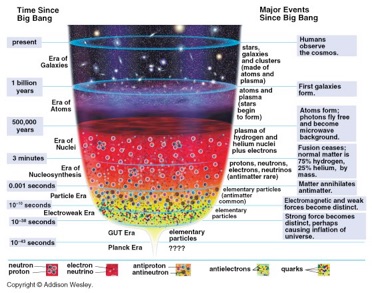
The First Three Minutes After the Big Bang
Instructor: Prof Sevil Salur
Office Hour: TBA at Serin 220 or by appointment.
Contact: salur@physics.rutgers.edu
Phone: (848) 445 8784
Seminars: Tuesdays from 10:20am-1:20pm ARC 205 Busch Campus

Our views of the universe have evolved in recent years by astronomical observations and experimental measurements performed in laboratories. We now have a better understanding of its initial conditions. In this course, we will be discussing what the universe is made of and what holds it together. Knowledge from various subfields of physics including nuclear, particle, quantum and astrophysics is required to describe the universe, especially its first three minutes. These initial minutes are very important as all major building blocks of our universe e.g., hydrogen atoms were formed during that time.
Weekly topics will include: Introduction & Scientific Theory, Experimental Methods, The Big Bang, Expanding Universe, Relativity, Curved Space, Particle Era, Quark Gluon Plasma, Era of Nucleosynthesis, Quantum Gravity & String Theory, Universe vs. Multiverse, Future Investigations. The underlying concepts of these topics will be covered at a level that can be followed by non-major undergraduate students with no prerequisite science classes, although prospective science majors are welcomed.
Please use Sakai chat room for questions: https://sakai.rutgers.edu/ (e-mail me if you cannot access the site.)
Required Text Book:
Big Bang, Black Holes, No Math by David Toback (BBBHNM) (e-book is ok.)
Other Recommended Reading:
1. The Science of Interstellar (Kip Thorne 2014)
-
2.Theory of Everything: The Origin and Fate of the Universe (Stephen Hawking, 2007)
-
3.A Briefer History of Time (Stephen Hawking and Leonard Mlodinow, 2005)
-
4. Stephen Hawking's Universe: The Cosmos Explained (David Filkin, 1997)
-
5.The First Three Minutes (Steven Weinberg, 1993)
